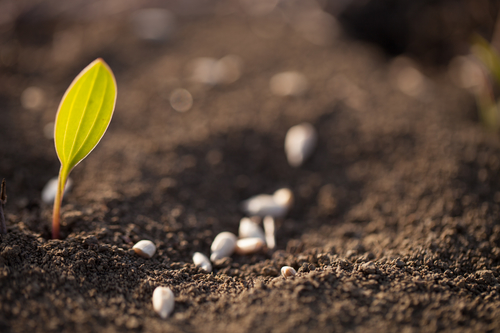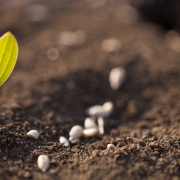Asking Without Doubting – James 1:5-8 – June 15, 2023
/0 Comments/in Enduring Words for Troubled Times, Enduring Words with David Guzik, Podcast/by David GuzikReceiving Wisdom from God – James 1:5-8 – June 14, 2023
/0 Comments/in Enduring Words for Troubled Times, Enduring Words with David Guzik, Podcast/by David GuzikThe Perfect Work of Patience – James 1:2-4 – June 13, 2023
/0 Comments/in Enduring Words for Troubled Times, Enduring Words with David Guzik, Podcast/by David GuzikBeginning of a Bold Letter – James 1:1 – June 12, 2023
/0 Comments/in Enduring Words for Troubled Times, Enduring Words with David Guzik, Podcast/by David GuzikPlanting Seeds
/1 Comment/in Weekly Devotional/by David GuzikBut someone will say, “How are the dead raised up? And with what body do they come?” Foolish one, what you sow is not made alive unless it dies. And what you sow, you do not sow that body that shall be, but mere grain; perhaps wheat or some other grain. But God gives it a body as He pleases, and to each seed its own body. (1 Corinthians 15:35-38)
The Corinthian Christians wanted to know, how are the dead raised up? The answer is obvious: God raises the dead. As the Apostle Paul said to Agrippa in Acts 26:8, Why should it be thought incredible by you that God raises the dead?

The Corinthian Christians also wanted to know, and with what body do they come? Paul answered this question with the analogy of the seed, explaining that our bodies are like “seeds” that “grow” into resurrection bodies. When you bury the body of a believer, you are sowing a seed that will come out of the earth as a resurrection body. This means that the Christian looks at death in an entirely different way.
No one likes the sound of the coffin lid closing, and the farmer does not like the act of scattering seed on the cold, dry earth just for its own sake. Nevertheless, no farmer weeps when he sows his seed because he sows in genuine confidence of a future harvest. At the open grave, the Christian should have the same confidence when the “seed” is “planted.” Our loved ones in the Lord are not lost; they are sown.
The seed analogy gives us more than hope; it also helps us understand the nature of our resurrection body. Paul describes it like this: You do not sow that body that shall be…. But God gives it a body as He pleases, and to each seed its own body. When you plant a wheat seed, a big wheat seed does not come up. Instead, a stalk of wheat grows. So, even though our resurrection bodies come from our present bodies, we should not expect that they will be the same bodies as before or even just improved bodies. They will be truly connected to our present bodies, yet in a more glorious form than ever.
The resurrection body of Jesus was connected to His previous body in appearance and general material nature – He was no phantom or ghost. Yet His resurrection body was more than just a better version of His previous body. Something had fundamentally changed in its nature, because it was described as a flesh and bone body instead of the far more typical phrase flesh and blood body (Luke 24:39). Jesus remains in His resurrected glory without aging or diminishing in strength – and that is something completely out of the realm of these bodies we presently know.
God has saved, is saving, and will save those who trust in Jesus and He will save them completely – body, soul, and spirit.


